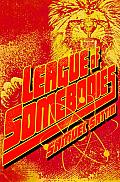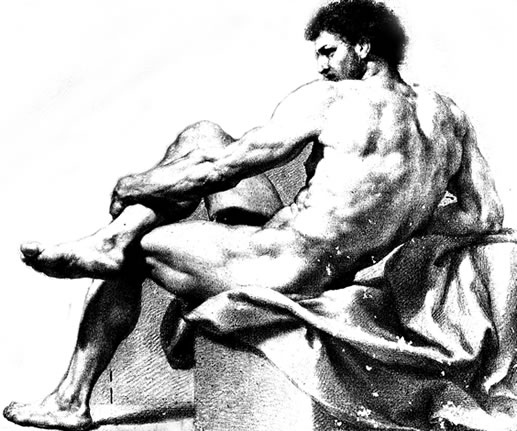
A critical feature of
League of Somebodies is the prevalence of outlandish tests of manhood, feats of intellectual and physical strength that hinder the main character, Lenard Sikophsky, and his future son, Nemo, as they strive to realize their potential. This potential, it should be said, infects their natures with a thoughtful brand of banality. There's something very "Sisyphus" about a hero's quest, anyway. Especially in a lazy story arc where the central goal is the attainment of physical strength.
As a child, I was a victim of precisely such a structure. When your father is a James Gandolfini-gaited Silverback at the head of his band with a chip on his shoulder and a dwindling hairline, you quickly learn what it is the average man views as top-notch. Stand up for yourself; learn to fight for what you want; don't give up; never take no for an answer. From what I observed growing up, it seemed as if most men viewed courage much in the way pyromaniacs do crates of dynamite. A person who exercises his passions in a dangerous fashion is considered brave, you see. But a person whose thought pattern is deliberative and soft? Well, he might as well sit atop the gunpowder. This is an archetype that can be just as easily used for Sully Sullenberger as it can someone who collapses a lung running into a burning building to save a bowling trophy (or in the case of my book, fight a giant lion inside the Boston Zoo). There's always great conviction at stake.

I guess then there's always been a good reason why I find comic books so fascinating. The best sources for contemporary hero narratives, they've truly tested the mold. The stars of my book, even the terrifying ones — the raving madman known to all of League's characters as Fearghas, for instance — are obsessed with maintaining a family line of superheroes so that their legacy continues to survive. Even though things change from generation to generation, much continues to remain the same. Just as with comic book creators, my characters learn that you must look back and forward at the same time in order to evolve.
Though our worth as a species depends on the manner in which we risk our comfort for the benefit of others, it's important to remember that courage comes in multiple forms. No one, no gender, no race, no creed has the monopoly on greatness. Although my main character has his own view of heroism, his son finds it utterly alien. Perhaps it should come as no surprise then that this man, Lenard — who as a child experienced frequent nightmares of underwater beasts — should have named the boy Nemo, slayer of Krakens. Nemo, who's meaning itself translates to "nomad" or "no one" and predicates a relationship with anonymity.
Albeit heroes are what ensure our moral survival, the definition of what constitutes one will continue to change with the wealth of human experience. As a species, we test ourselves every day. Feats of strength are not so bad as long as strength itself is defined in the eye of the beholder. The more we do that, the more our stories will improve, and the more we'll continue to grow.
More from Samuel Sattin on PowellsBooks.Blog: